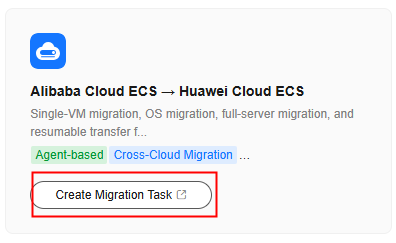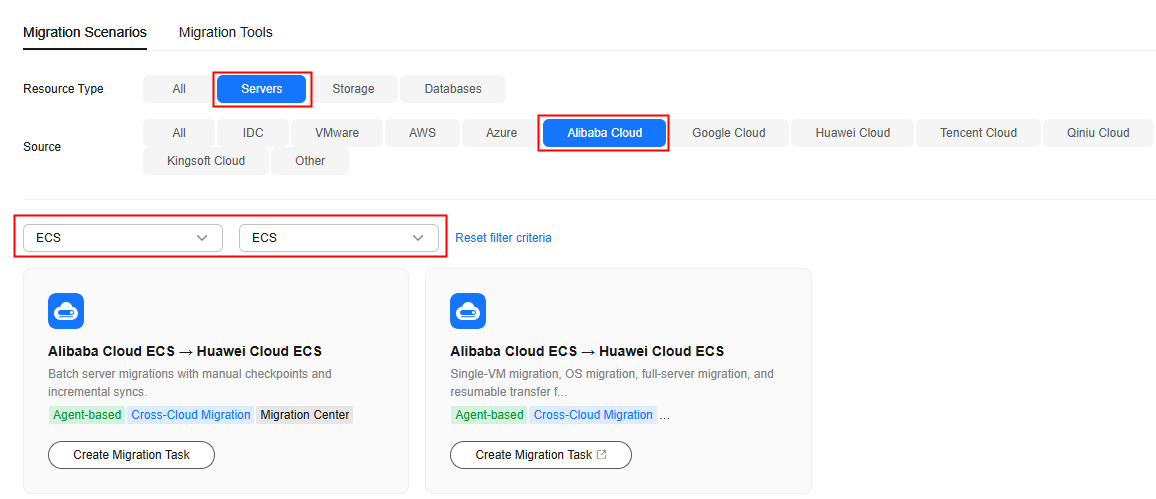Migration Tool Center (New)
Different cloud migration scenarios often require different tools, which can lead to fragmented operation flows. Switching between multiple interfaces and performing complex operations can significantly reduce migration efficiency. To address this challenge, MgC consolidates tools for various migration scenarios including server, storage, database, middleware, and container migrations into a unified platform. You can create migration tasks with a few clicks, improving operation convenience and efficiency.
Prerequisites
- You have completed all preparations.
- You have created an application migration project.
- You have discovered source resources to be migrated using online discovery or intranet discovery.
Constraints
Only the AP-Singapore and TR-Istanbul regions are supported.
Quickly Filtering Migration Scenarios and Creating Migration Tasks
The following steps describe how to quickly locate the scenario and create a migration task for migrating Alibaba Cloud ECSs to Huawei Cloud ECSs. The operation process is similar for other resource types.
- Sign in to the MgC console. In the navigation pane, under Project, select your application migration project from the drop-down list.
- In the navigation pane on the left, click Migration Tool Center.
- On the Migration Scenarios tab, use filters such as resource type, source location, source component type, and target component type to locate your scenario. The corresponding migration tools will then be displayed. Figure 1 shows how to locate the tools for migrating Alibaba Cloud ECSs to Huawei Cloud ECSs.
- Hover over a card to view the key features, application scenarios, advantages, and constraints of the corresponding migration tool. Then, select a tool that best matches your migration needs and proceed to create a migration task.
- Single-server migration: SMS is recommended. Click the SMS card or Create Migration Task on the card to go to the SMS console. Create a migration task on the SMS console by referring to Configuring a Target Server.

- Batch server migration: MgC is recommended. The procedure of creating a migration task is as follows:
- Click the MgC card or Create Migration Task on the card.
- Configure the parameters based on Table 1.
Table 1 Parameters for creating a task Parameter
Configuration
Method
When creating a task for the first time or from scratch, select Create new.
If there are incomplete tasks (drafts) for the current migration scenario, the system selects the latest draft from the drop-down list and allows you to continue the editing.
Task Name
The system sets a task name based on the following rule by default: migration scenario-core tag+4 random characters (letters and digits). You can also specify a task name.
Only letters, digits, hyphens (-), underscores (_), and periods (.) are allowed. The name must start with a letter or digit, and it must not start or end with a period. It cannot exceed 64 characters.
Description (Optional)
Enter a task description.
- Click Create. The migration task is created, and the task configuration phase starts.
- Configure the migration task immediately. Follow the steps in Creating a Batch Server Migration Plan to configure the migration task and start the migration. The steps include selecting source resources, checking migration readiness, and configuring target resources. After the migration is started, it is automatically synchronized to the Migration Task Center page, where you can manage migration tasks in a unified manner.
- Save the migration task as a draft when you want to configure the task later or when the task configuration is not complete. After you return to the Migration Tool Center page, the system automatically saves the task as a draft. When you create a migration task for the same scenario, the system automatically selects the latest draft, and you can continue to edit the draft. You can also create a task from scratch.
You can also find the incomplete task in the Drafts list on the Migration Task Center page and continue to configure a task using this draft.
- Single-server migration: SMS is recommended. Click the SMS card or Create Migration Task on the card to go to the SMS console. Create a migration task on the SMS console by referring to Configuring a Target Server.
Viewing Migration Tools and Documents
MgC integrates leading migration tools on Huawei Cloud to support a wide range of resources, including servers, storage, databases, middleware, and containers. These tools are organized by migration scenario for streamlined access. MgC also provides direct links to the help documentation for each tool, making it easier for you to understand and operate them effectively.
- Sign in to the MgC console. In the navigation pane, under Project, select your application migration project from the drop-down list.
- In the navigation pane on the left, click Migration Tool Center.
- On the Migration Tools tab, check migration scenarios and migration tools. You can filter the tools by resource type.

- Click Documentation on a migration tool card to view the tool guide.

- For tools not provided by MgC, click Access Console to go to their consoles and create migration tasks.

Feedback
Was this page helpful?
Provide feedbackThank you very much for your feedback. We will continue working to improve the documentation.See the reply and handling status in My Cloud VOC.
For any further questions, feel free to contact us through the chatbot.
Chatbot






